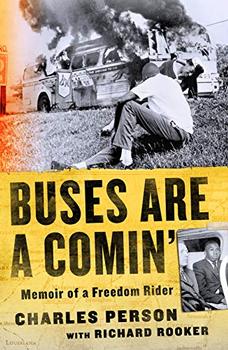Summary | Excerpt | Reading Guide | Reviews | Beyond the Book | Readalikes | Genres & Themes | Author Bio

Memoir of a Freedom Rider
by Charles Person, Richard Rooker
Had I enjoyed an abundance of awareness of the physical world around me, I might have noticed the Bottom reeked. Decay permeated nostrils. I did not smell it. Coal-burning trains spewed black sewage skyward. I did not detect it. Fulton Bag and Cotton Mills billowed clouds of cumulous gray. I never noticed it. The black soot climbing into the blue had to fall somewhere. It fell on us—on me. I did not feel it. The smell of chitlins cooking and the smell of collard, turnip, and mustard greens with ham hocks jarred our sense of smell, but they tasted good. Drunken old men smelled of liquor and urine. They smelled of whiskers and wrinkles, too. They, like us kids, lived oblivious of the obvious—the Bottom offended human senses if you were aware enough to notice.
Wide, unpainted, rotting clapboard houses hugged Bradley Street. Slatted-wood porches held rickety chairs. Rickety people sat in those chairs. At least that's what Kenneth and I thought. Rusted tin roofs repelled the rain except where holes had worn through. In the Bottom, it rained inside and outside.
Unpaved streets meant that the few cars in the Bottom bounced and bumbled at speeds kids could outrun because speed raised dust. The dust of clouds was one more thing to fall on us. We didn't need anything more falling on us.
In the Bottom, everyone had exquisite dark skin—shades that ranged from light brown to dark chocolate—except for a small minority. The milkman was white. The laundry owners, Asian. The owners of the ice cream shop, Greek. The insurance man stood out to Kenneth and me because he had chalky-white skin, straight hair, thin lips, and a thinner nose. We made fun of that.
"Press your nostrils together and inhale," I coaxed Kenneth.
He did, but it didn't last.
"You do it," Kenneth said.
"I'd rather look like Satchmo." I flared my nostrils out.
That didn't last either. We laughed longer than either of our nose contortions lasted. I guess we learned we have the noses we're born with.
Years later a man I did not know and would never meet again decided to reshape my nose for me because he did not care for where I chose to sit on a bus. Why my nose and the rest of me mattered so much to him I do not know, but it did.
On Bradley Street we lived in a two-room, second-story apartment in an eight-apartment wooden building. Six small upstairs apartments sat atop two large apartments at ground level. This was the one time in my early life I got to be on top. To get home, we climbed an outside staircase and proceeded down a street-facing balcony past other apartments till we reached 5B.
The words apartment building are accurate, but they do not capture 21 Bradley. Warped planks formed the floors, the walls, the ceilings. I remember the balcony felt solid, but its railing looked more like rolling waves than leveled wood. Most windows in the apartments were glass. A few were holes in the walls boarded up with nailed, horizontal slats of pine. Gaps in the slats allowed daylight in and kept most rain out. No foundation existed. Every eight feet or so, blocks of stacked bricks propped the building three feet off the ground. A lot of brick was missing from those supports that held up 21 Bradley, but the building still stood. It tilted a little, but stood.
The front door of our home opened to a combined living room and bedroom. That's where Mom and Dad and my younger sisters Norma Jean and Carole slept. The second room was a combined kitchen, dining room, and bedroom for Mama Arlena (we called her Malena), my brother Jimmy Dale, and me. My younger three siblings had not yet come along, so there was plenty of room for the seven of us in the two rooms of 5B. Our toilet was outside on the back balcony. We shared it with the other families in the upstairs units of our building.
Today, I know life was small on Bradley Street, but a few blocks away life was big. Ebenezer Baptist Church. Bethel AME Church. Wheat Street Baptist Church. Big sanctuaries. Big steeples. Big congregations. Big voices from the pulpits and choirs. Preachers with big personalities.
Excerpted from Buses Are a Comin' by Charles Person and Richard Rooker. Copyright © 2021 by Charles Person and Richard Rooker. Excerpted by permission of St. Martin's Press. All rights reserved. No part of this excerpt may be reproduced or reprinted without permission in writing from the publisher.




If you want to build a ship, don't drum up people... but rather teach them to long for the endless immensity of the...
Click Here to find out who said this, as well as discovering other famous literary quotes!
Your guide toexceptional books
BookBrowse seeks out and recommends the best in contemporary fiction and nonfiction—books that not only engage and entertain but also deepen our understanding of ourselves and the world around us.